Virtual U
Vitual U is an independently produced higher-education management simulation that blurs the boundary between a strategy game and a training tool. Here is a look at the game followed by an interview with the worldwide development team.
Virtual U
Developers: Enlight Software, the Jackson Hole Higher Education Group, and the Institute for Research on Higher Education
Publisher: Anker Publishing
Release date: available now
By T. Byrl Baker
Virtual U certainly has the most interesting background of all the Independent Games Festival finalists. Three separate developers were involved in the creation of this university administration simulator, and it definitely isn't aimed primarily at gamers. Instead, Virtual U was designed as a fun tool that real administrators, deans, and university donors could use to juggle all the aspects of managing a university in minute detail.
The game was the brainchild of Dr. William F. Massy, who served as CFO and vice-president of business and finance at Stanford University for 14 years and is currently president of the Jackson Hole Higher Education Group. Dr. Massy developed the simulation engine based on data provided by the Institute for Research on Higher Education, and he was looking for a way to make the simulation user-friendly. That's where Enlight Software enters the picture.
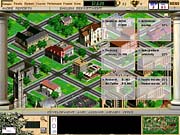
Enlight Software was responsible for wrapping the simulation aspects and raw data in a playable game engine, and it did an exceptional job of doing so. The company was founded by Trevor Chan, who had already established his reputation as a hard-core simulation master with the Seven Kingdoms strategy games were known for the detail of their economic and political engines, despite their fantasy setting. Enlight took a game that could have been simply a series of boring spreadsheets and livened it up by creating a beautiful and accessible menu-driven interface, adding missions and goals, and establishing a feedback system that lets players know how they are doing. The scenarios range from finding ways to lower tuition or raise instructor pay while still remaining profitable to improving the athletic department or overall university research without shortchanging other departments. It also is possible to play in an open-ended mode, where players can design their own university and attempt to run it for as long as possible.
Each Virtual U campus can have up to 15 separate departments, with as many as 500 individually modeled professors teaching up to 10,000 unique students. You don't have control over each student, but you can try to establish programs or create funds that attract minority students and increase the university's diversity. It also is possible to meddle with professors' salaries, research funding, workloads, and other variables to make each department as productive and happy as possible.
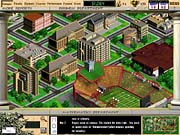
A staggering amount of tweaking is possible, and the time we've spent with the game shows that success requires some serious management skills. A minor budget adjustment in one place can have major effects in a variety of seemingly unrelated departments, and there's never enough money to adequately fund all aspects of the university. Focus on stellar education at the athletic department's expense and the school teams will start losing games, which causes alumni-donor dollars to dry up. Even the best-laid plans can be derailed by "chance cards," like an assault on campus or an embezzlement scandal. Of course, these random events work both ways, such as the football team winning the national championship or a professor winning a Nobel prize. Virtual U is a serious tool that also happens to be fun, and any fan of business simulations will be humbled by its depth. We asked the development team about the reaction the simulation has received so far and the amount of work involved in its creation.
Next: Read the Q&A with the Virtual U team's Ben Sawyer et al.
Q&A With The Virtual U Team
GameSpot talks to the worldwide Virtual U team through Ben Sawyer about higher education, management, and simulations.
GameSpot: What has the reaction been like from the university administrators who have tried Virtual U?
Virtual U Team: It's been one of some amazement that we have captured in no small way many of the issues and dilemmas of running a university. They also appreciate the complexity of it and the new approach of combining game design and interactivity with public policy and training issues.
GS: Are there plans to add more features to Virtual U and continue its development?
VUT: Absolutely. We're in the process of designing Virtual U 1.5 and 2.0. 1.5 will improve some of the interface, improve printing (which is important for classroom use), fix some structural issues for hardware compatibility, and set the stage for 2.0. Unlike a lot of game products, future versions of Virtual U will feature a lot of code reuse and evolution--more like a traditional computer application than a game. This is because we're very math-intensive and because we need to have an incremental approach due to funding and the independent nature of our work.
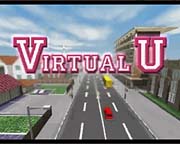
GS: Can gamers expect a consumer version of the game any time soon?
VUT: There is a $60 "game version" available now. We may begin to discount that more, and we might (when 2.0 comes) improve our ability to deliver a product specific to gamers who appreciate simulations of complex systems. We also have a small playable demo for people who simply want to see what we've done and how we've tackled this problem.
GS: How detailed is the simulation engine powering Virtual U?
VUT: [smiling] It's quite detailed. Dr. Massy, the designer of the product, was the CFO at Stanford University for quite some time. He is an economist by nature and has studied and written about university management and its issues for many years. All of [his] experience, [the experience] contributed by Trevor Chan (who many know as the developer of the amazingly detailed Capitalism and Seven Kingdoms series), and the data collected by Robert Zemsky and his team at the Institute for Research into Higher Education (IRHE) at the University of Pennsylvania [were] combined to create an exceedingly detailed model. While we have many ideas and suggestions for how to make it better and more detailed for 2.0, we're constantly amazed by how much was able to be crammed into 1.0.

GS: How much work went into gathering the data Virtual U draws on?
VUT: A lot. There was a major gathering of quantitative data as well as a lot of "observational recall" by Dr. Massy and others involved with the project. The national leaders in higher education data at the University of Pennsylvania amassed and organized most of the data for VU.
In terms of "observational recall," that means a lot of time spent thinking about various correlations that might not have true data sets to draw upon but which still need some level of reflection in our product. For example, faculty morale isn't something we can measure as easily as how many students are in a typical art department at a small liberal arts college, but in terms of creating formulas, the designers had to draw from the "data" of their life experience to approximate what they thought was a realistic way to compute this. This is something designers do all the time, but we had the luxury of having some people with deep, deep life experiences running universities at the helm to help.
Since we've launched, we've been hearing from others in the academic community about other data sets and formulas we might try to incorporate in future versions, so this is very cool. One thing that we're very interested in is the data just becoming available on distance education issues such as student participation, cost effectiveness, and more. It's an area that is going to reshape a large section of higher education, so there is a lot of interest in it, and it's something that is in our engine but is not as robustly simulated as possible.
Next: Blurring the lines between a game and a training tool
GS: Has Virtual U been used in any unique ways that you didn't anticipate?
VUT: The surprise has been the interest in VU as a training tool. We thought more of the market would be faculty who wanted the vicarious experience of being the boss. In fact, people are using VU as a serious way to get better at the managerial work they do.
Certainly the training in classrooms was something that we anticipated, but we didn't realize the degree to which it would be the heart and soul of the product's predictable future.
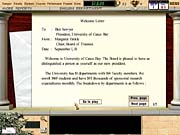
We've also been surprised by the interest expressed by groups such as unions and other groups that have to deal on a daily basis with universities. These groups realize how complex a university and its budget really are, and we've had some interesting inquiries into using it to help enlighten people about how the entire "ecosystem" of a university works. Finally, the foreign interest in Virtual U has been much more substantial than we thought. We've had orders from England, Mexico, France, Hong Kong, Australia, and the Philippines, to name a few.
GS: Has the game done anything to surprise you in any of the simulations you've run?
VUT: You mean aside from the bugs we've found at inopportune times? [laughing] For the most part, Virtual U is more surprising in how we can come up with new ideas to use it for than in the game itself. In general, we're surprised most by how people tackle the problems it presents. It's surprising to see people, many of whom have never played a game beyond Solitaire before, get into this thing and start dealing with it.
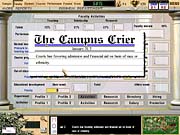
It's also surprising how the game shows why universities are, in fact, a lot more stable than, say, companies. It takes quite a few bad decisions to "lose" a university. No single decision is likely to cause fatal harm.
The only other surprising thing that sticks out right now is when we found a feature to give early retirement to faculty. Some of us didn't know it was there until the last second, and that required some rewriting of the accompanying strategy guide since it created an amazingly important strategy in reshaping the faculty of a department. There is no way to dismiss faculty in Virtual U otherwise, so this is a big deal.
GS: Are there any aspects of Virtual U that you are particularly proud of?
VUT: We're proud of the accuracy and completeness of the financial flows. Also, the collaboration between experts in gaming, experts in the substance of higher education, and experts in operations research and simulation modeling was truly fun and creative.
We'd also like to highlight Virtual U's importance for philanthropic organizations such as the Sloan Foundation, which used it to learn and appreciate the immense power of gaming for achieving social goals, such as improving the management of higher education.
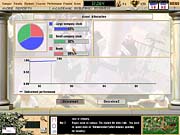
We have a great representation of how game design and development isn't just for car racing, shoot-'em-ups, and sports sims. Don't get me wrong--some of the people on this project like Trevor and Ben love real-time strategy titles or fragging and rocket jumping as much as anyone, and both of them play every other type of game to death. However, as a whole, for those on the team who have spent a lot of time writing about and working in and around games, it's great to get the chance to evangelize the community's skills and technology to a wider audience. Doom and Quake are used by the Marines, Maxis helped the Markle Foundation develop SimHealth, and there are more than a few places probably using SimCity, Capitalism, and other products for educational, training, and enlightenment purposes. Maybe next time Congress holds hearings on the gaming industry, we should present these applications of gaming?
Next: How an indie project came together
GS: When and why did you decide to tap Enlight Software for the design of the game?
VUT: Enlight became involved over two-and-a-half years ago after Dr. Massy and Jesse Ausubel had sketched out the concept. Sally Massy (Dr. Massy's wife) thought if Trevor could design and program Capitalism that Virtual U and Enlight would be a natural fit. It certainly has been--Trevor not only brings an appreciation for these types of simulations, but he also really loves to research and understand the math behind them. He doesn't just want to produce the product as ordered, and that's an important key to making these types of projects successful. The designer has to have some personal interest in it and not see it as just some consulting project to check off on his or her time sheet.
GS: How much work went into balancing the game's simulation and educational aspects against its playability and fun factor?

VUT: Quite a bit at the end--it was something that Trevor really stressed. I think in some ways we knew it wasn't going to be "tons of fun," but we tried to make sure there was a logical flow to what you did and enough random variance to keep people on their toes. Going forward, we have some ideas on how to improve these issues, but for now we think that, given Virtual U's purpose and subject matter, a good initial balance was made.
GS: Are there any aspects of being independent that hampered the progress of your game?
VUT: Unlike some of the other projects in the competition, we certainly had good financial support, so we can't say we were a struggling "garage band" of developers. Despite that, this game definitely has an independent feel.
GS: What advice would you give to others who would like to independently produce and publish a game?
VUT: Most of all, make a game you believe in and that drives you to get it across a finish line (any finish line) any way you can. If there's one thing everyone should know about software development, game development, writing, or any big project, it's that even though you can always make the process of creating a product faster (that is, on time), smoother, less expensive, better, and so forth, the difference between success and failure is finishing. The one thing you have going for you with this festival and the key thing to prove in trying to become a commercially capable developer is that you can take something from idea to full concept to finished project. People are not going to give you thousands or millions of dollars if they think you'll never finish something. They'll bail in a heartbeat.
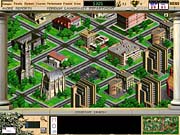
The next most important thing for independents is to pick an area or application of gaming that they can really stand out in. Serious Sam notwithstanding, it's not smart to go up against the Quakes and the Baldur's Gates of the world. Think of something novel and different, especially in terms of subject matter. For example, there hasn't been a good political simulation in a long, long time--and there are thousands of political junkies out there to go after to support your product and even buy it from you.
Thirdly, work on your promotional skills and your online distribution skills. It takes a lot of work to build a good site, support players, find download sites, send out reasonable press releases, and more--don't discount how important it is to use the Internet to create success for your product.
Finally, don't try to be the next greatest developer since Naughty Dog, Id, or BioWare, etc. Don't try to create the greatest game of all time in your first attempt. Just do something clean, tight, and good and build up to the point where maybe Mike Wilson or someone else might give you the infrastructure and support you need to do something even bigger and better. The only way you can violate this rule is if you truly, truly have the skills out of the box, so be honest with yourself and your capabilities. If it's not apparent that the stuff you're throwing up on the screen is as cool as Unreal or as complete as Railroad Tycoon, stop and scale back.
Next: How does an indie developer attack marketing?
GS: What tools were used in the development of Virtual U?
VUT: Visual C++, DirectX, and some in-house development libraries. Mathematica was also used to model and work out a lot of the math behind the engine.
GS: How do you handle business problems like marketing, given your relatively small budget?
VUT: Well, we have a marketing budget--[but it's] more of a community-building budget to promote the product to its core audience of educational leaders and university professionals. The biggest thing to do is spend it slowly and wisely so it can last because it takes a while to build up a community and find your best audience and message. Whether it's the time you spend or the money you spend, you can't do it all at once. No project--not even ours--has the reach a big publisher with a sales and marketing force has, so you just have to not try and win it all in the first month. Especially with independent projects that may be focused on a niche, it's important to constantly take your time to work all the angles and possibilities in promoting and marketing your product.
GS: Any thoughts on the future outlook for independent developers?
VUT: We think it's particularly bright. No matter how many consoles there are or how high the production costs for some titles can get, there are always going to be opportunities for people who think outside the normal applications, ideas, platforms, and approaches created by those that have achieved mainstream success. There is a need for this, so it won't go away. Perhaps the biggest threat to independent development is the rising tide of independent movie production and independent broadcast production on the Internet, which will compete for the ideas and dreams of independent creative minds.
GS: Is there anything you can accomplish as an independent designer that would be difficult to achieve if you were working for a large company?
VUT: For us it's clearly the subject matter. This project represents the role foundations play in our society. They tend to fund projects whose impact is not always measured by straightforward commercial success. Virtual U would never be funded by any reasonable commercial company, but that doesn't mean its impact won't be important or felt in other ways. We're clearly shaping some debate on university management and getting publications like the San Francisco Chronicle, The New York Times, and Science Magazine to write about VU. Its message and subject matter are important.
GS: On the flip side, what advantages do the big publishers have over you that would greatly enhance Virtual U?
VUT: As said before, their overall production approach, experience, and ability to help pursue things in parallel would have been greatly helpful.
GS: Were there any major glitches you had to overcome while creating Virtual U?
VUT: Everything was new. The whole game was invented, every single part, from the component models to the interfaces. There were no precedents on which to build.
The biggest was probably trying to just pull the thing together at the end. There were so many loose strings to tie up, and we were all so far away from each other that the last few months before we christened the first version was an agonizing experience at times. This is probably true for a lot of projects--commercial and independent--but I think the team's experience of finishing major works, be they games, books, reports, etc., pulled us through when frustration levels got high. That is why showing you can finish something and having a goal like the Indie Games Festival is so important for independent game developers.
Got a news tip or want to contact us directly? Email news@gamespot.com
Join the conversation